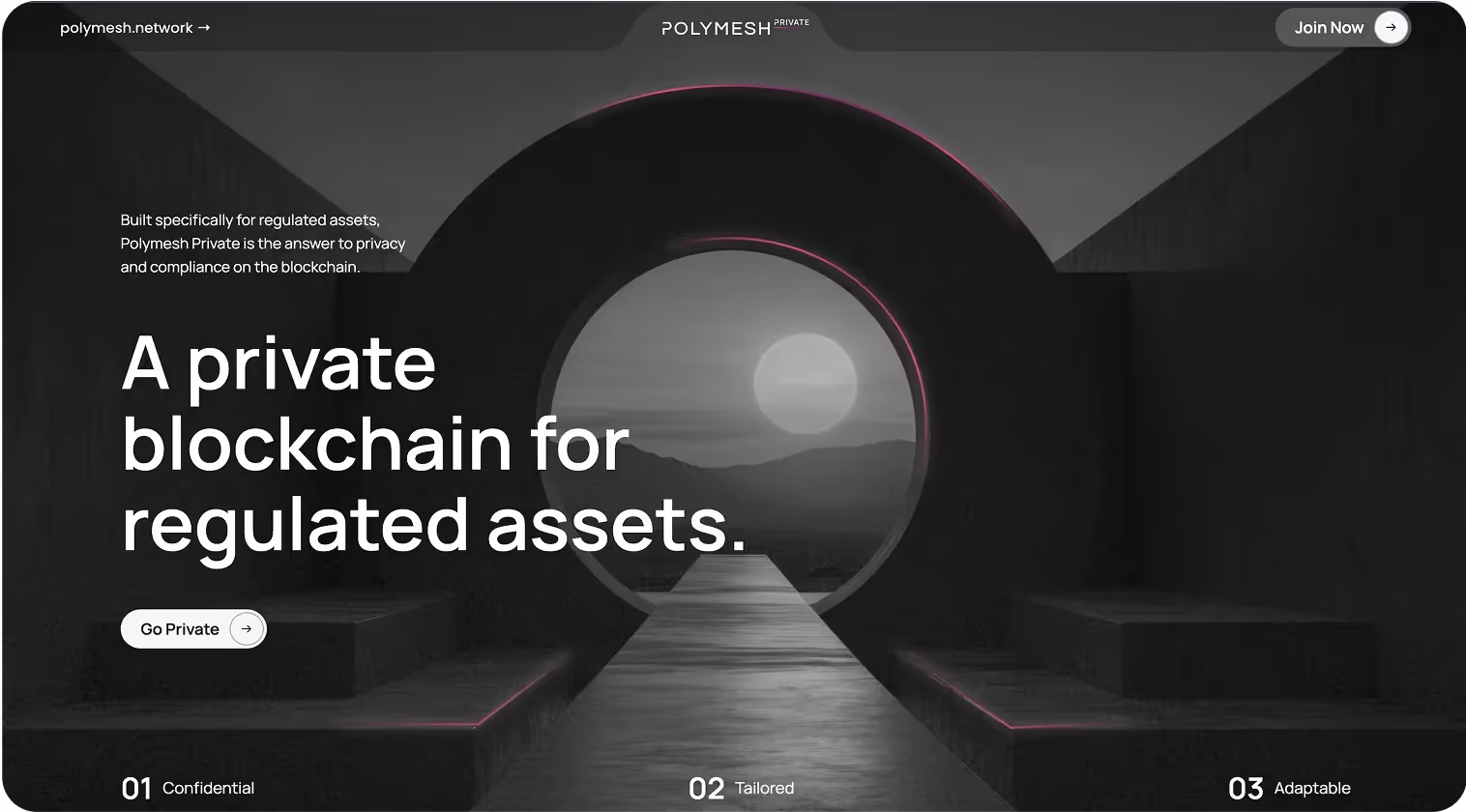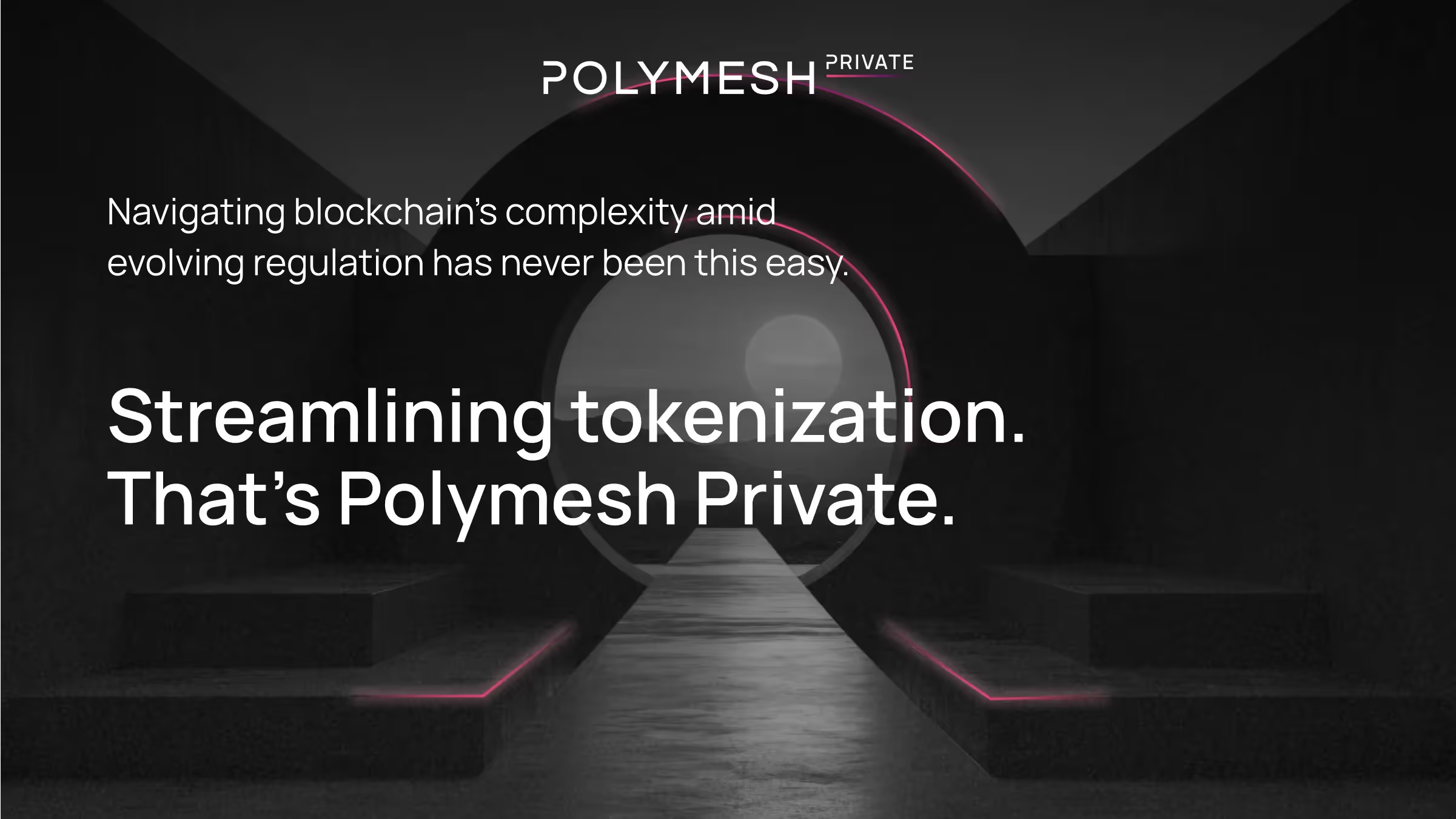Core elements of the Polymesh Private blockchain
As financial institutions explore the potential of blockchain technology for transforming existing workflows and introducing new financial products, it’s essential to understand the key components.
Polymesh Private is built specifically for asset tokenization, offering financial institutions with unique needs the enhanced privacy, compliance, and operational control they require. In this blog post, we’ll explore the core elements behind Polymesh Private and how they contribute to a robust, efficient blockchain infrastructure for enterprises.
What are the core elements of the Polymesh Private blockchain?
Polymesh Private is a bespoke, private instance of the Polymesh blockchain. It shares its core infrastructure with Polymesh, the public permissioned blockchain, which is founded on five key pillars: governance, identity, compliance, confidentiality, and settlement.
Additionally, Polymesh Private is built on three core elements that differentiate it from public blockchains:
Operational Control
Operating entities have complete discretion over the blockchain environment, including who can participate, whether to include network tokens, network fees, block size, and transaction speeds. This flexibility ensures the blockchain can be tailored to the specific needs of the business and work seamlessly with its operational goals, without facing issues in scalability, throughput, or compliance.
Privacy
Unlike public blockchains where transaction details are visible to everyone, Polymesh Private incorporates cutting-edge cryptography to ensure that transaction amounts, account balances, and asset types remain confidential. Only relevant parties can decrypt sensitive information, protecting confidential data – a crucial requirement for institutions handling sensitive financial and personal data.
Public compatibility
Polymesh Private is designed for compatibility with public environments – something no other private blockchain can offer. Running on the same architecture as Polymesh, users of Polymesh Private can enjoy developments, new features, and releases for the public network should they choose.
Compatibility between the two networks provides businesses with the flexibility to transition to public infrastructure when ready, ensuring financial institutions can harness the benefits of both private and public blockchain technology as their needs evolve. This is a major advantage for an industry where innovation is fast-paced and the technology is ever-changing.
What are the benefits of using a private blockchain for institutional purposes?
For many entities, integrating with public infrastructure carries too much risk, especially as digital asset regulation is still evolving. Many financial institutions choose to integrate with private blockchain infrastructure instead, as it can offer greater security and privacy.
For institutions managing regulated assets, Polymesh Private offers a completely controlled and customizable environment that can meet the rigorous requirements of regulated finance. Here are some of the key benefits of using a private blockchain such as Polymesh Private for institutional purposes:
Security
Private blockchains operate with a limited set of participants who are verified and authorized to access the network. This reduces the risk associated with open, permissionless blockchains where anyone can participate, including blacklisted entities or malicious actors. Polymesh (the public permissioned blockchain) also reduces this risk by leveraging an identity verification system, ensuring all participants are known and verified actors. However, some institutions need even greater control. With a private blockchain, institutions can safeguard financial data and transactions, ensuring a higher level of trust and security.
Privacy
Privacy is a critical requirement for institutions managing sensitive data, such as financial transactions or investor records. Unlike public blockchains, where all data is publicly accessible, private blockchains like Polymesh Private allow for granular control over who can view specific transactions. This ensures that confidential information remains visible only to authorized parties, protecting both institutional and client data.
Regulatory compliance
One of the biggest advantages of private blockchains is their ability to incorporate regulatory requirements directly into the network’s architecture. Private blockchains can be customized to meet specific KYC, AML, and data privacy regulations, enabling financial institutions to remain compliant without needing complex, external tools.
Polymesh (the public permissioned network) eliminates this problem by providing native functionality for compliance at the protocol layer. For institutions who need extra compliance consideration – such as entities concerned with using public tokens – there’s Polymesh Private.
Permissioned participation
Unlike public permissionless blockchains, where anyone can join the network, private blockchains require permissioned access. Only verified entities can interact with the network, reducing the risk of fraud or unauthorized access. What distinguishes public permissioned networks from private permissioned networks is that on private networks, one or a few entities are in control of the permissioning, providing greater control over network access at the cost of decentralization. Permissioned blockchains are ideal for institutional collaborations, as they enable secure and efficient communication between known, trusted participants.
Scalability and efficiency
With fewer participants and a controlled environment, private blockchains can be more efficient than their public counterparts (although not necessarily!). This is crucial for institutions that require fast and reliable processing of high-value transactions.
How does Polymesh Private differ from public blockchains, including the Polymesh public permissioned blockchain?
While public blockchains like Ethereum offer decentralization and transparency, they fall short in meeting the needs of financial institutions handling regulated assets.
For one, public blockchains can be permissionless: they can allow anyone to participate, which increases the risk of interacting with blacklisted or unverified entities. Polymesh eliminates this risk by providing a public permissioned blockchain, but for institutions looking for additional control over their environment, there’s Polymesh Private. The Polymesh Private environment is a fully private environment under your control: you choose who can access and view your network, on your terms.
Another issue is that public blockchains do not have built-in compliance tools, making it difficult for institutions to meet regulatory requirements. On these networks, compliance is handled by the introduction of layer-2 solutions and smart contracts, which can be expensive, resource-heavy, and slow the network down.
Again, Polymesh (the public permissioned blockchain) eliminates this problem by providing native functionality for compliance at the token-level. Digital asset issuers can embed customizable compliance rules into security tokens for automatic enforcement in transactions. Rules can be modified at any time, allowing issuers to keep up with evolving regulatory requirements.
Polymesh Private takes this one step further by giving enterprises complete control over their blockchain environment. Rather than restricting trade with a certain jurisdiction for the tokens individually, it’s a lot easier to restrict network access (provided a blanket-ban is desired system-wide). The other benefit of Polymesh Private over the public network is that it does not require public tokens, something which many institutions are still worried about given the current regulatory climate.
Overall, whether you need private or public infrastructure, Polymesh’s native compliance features and permissioning ensure that institutions can confidently manage regulated assets with less risk of non-compliance or interaction with unauthorized entities.
Polymesh Private: uniquely private, uniquely yours
In summary, Polymesh Private stands out as a unique solution for institutions that require a highly customizable, secure, and compliant blockchain environment. By providing institutions with operational control, robust privacy protections, and seamless compatibility with the public environment, Polymesh Private enables organizations to harness the benefits of both private and public blockchain infrastructure.
Handling sensitive financial data, ensuring regulatory compliance, or optimizing network performance are all possible on Polymesh Private. Its unique infrastructure and core features enable institutions to confidently explore the potential of asset tokenization while maintaining the flexibility to evolve alongside the industry. Seamless integration with the broader Polymesh ecosystem means institutions can stay ahead of development and innovation without sacrificing security or privacy.
If you’re looking to enhance your organization’s compliance and privacy when using blockchain, Polymesh Private is a solution uniquely designed for your needs. Contact our team today to discuss solutions for your regulated assets.
Enter Polymesh Private, a bespoke privately-run instance of the Polymesh blockchain that combines the benefits of its purpose-built infrastructure with enhanced privacy and control.









































